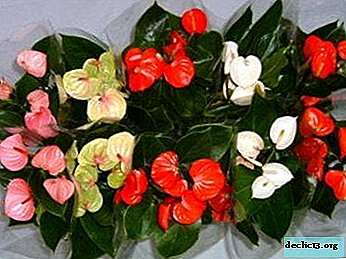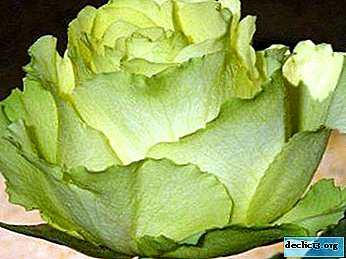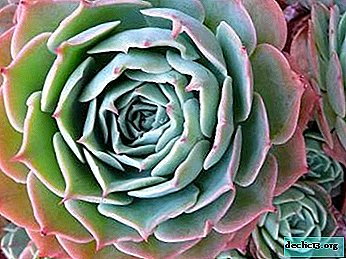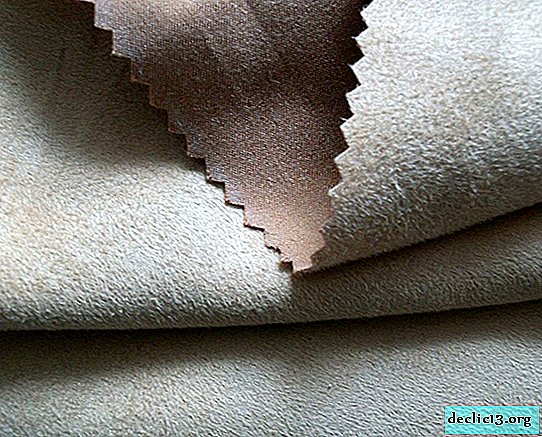Description, properties and photos of Jerusalem artichoke roots. How to use for medicinal purposes?
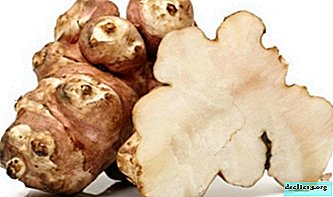
Summer cottages and vegetable gardens abound with various plants, both tubers of flowers and seedlings of wild plants. Many of the vegetables grown are of high mineral value, for example, a North American plant such as Jerusalem artichoke.
From this article you will learn all about Jerusalem artichoke root, its medicinal properties and types, as well as how to use this universal remedy for any diseases.
What is it: botanical description and photo
Jerusalem artichoke root (another name for this plant is artichoke or Volga turnip) is a North American plant from the family of tuberous sunflower, earthen pear and sun root. He is also referred to the Astrov family.
The aerial part of this plant (i.e., leaves and stem) is similar to a sunflower. A Jerusalem artichoke root is a pear-shaped tubers. The color of the plant may be different: yellow, white or purple. Jerusalem artichoke, which is yellow in taste, is similar to radish, and resembles ginger and potatoes.
The Jerusalem artichoke tubers are superior in yield to other fodder crops, usually ripen in the period from September to October.Seeds ripen only in the southern regions of the Russian Federation, for example, in the conditions of the Maykop experimental station VIR.
Despite the fact that there are about 200 species of this plant, only two are used in Russia. The plant is grown, most often, for the treatment of various diseases and ailments. But it also serves as animal feed.
But Jerusalem artichoke tubers can be consumed as well, only in boiled form. You can prepare various salads from Jerusalem artichoke with the addition of vegetable oil and other healthy vegetables or bake in a pot with meat. Next, you can see how the tubers of the plant look in the photo.




The chemical composition of earth pear tubers
Jerusalem artichoke roots have high energy and vitamin value, so they are often used for medical purposes. This plant is a storehouse of nutrients. The roots of this earthen pear contain:
- vitamins of the group: B (B1, B2, B3, B5, B6, B7);
- fatty and organic acids that positively affect the functioning of the human digestive system.
The composition of the earth pear tubers contains nineteen amino acids, and they have an effect on muscle function, metabolism, as well as on the state of the brain as a whole. Water occupies most of the root of this plant. The composition also contains:
- 1% fat;
- 11% protein;
- 5% fiber;
- 6% ash.
In the chemical composition of Jerusalem artichoke roots, the amount of zinc and iron is several times greater than in carrots or beets. That is why it is recommended to eat for people who suffer from diabetic complications, obesity and in the presence of heart disease. For 100 grams of cooked roots of an earthen pear accounted for:
- about 11 grams of carbohydrates;
- 7 grams of fat;
- 3 grams of protein.
Calorie content is 113 grams.
Useful properties and contraindications
Due to the abundance of useful elements in the composition of Jerusalem artichoke roots, it is used for medical purposes. Most the roots of Jerusalem artichoke are widely used in the treatment of various diseases, eg:

- in the treatment of patients with diabetes;
- to strengthen the human immune system and reduce the risks of strokes;
- to maintain the digestive system.
- Jerusalem artichoke root is used to maintain the balance of potassium and sodium in the body, that is, it prevents the appearance of edema.
- Since this vegetable is rich in inulin (fructose), it affects the amount of bifidobacteria in the body, produces vitamins necessary for the human body.
- Jerusalem artichoke tubers reduce blood cholesterol, prevents constipation and the development of cholelithiasis.
- It improves blood circulation and eliminates pain in joints and muscles, fights against nausea and heartburn.
- With the help of this vegetable, a number of diseases are treated. For example: gastritis, stomach ulcers, pancreatitis.
- Another use of Jerusalem artichoke in folk medicine is liver cleansing. Raw root, which is used in salads and other dishes, removes toxins from the body and restores the liver.
- Many girls introduce the roots of this plant in the diet of their diet when losing weight, when they adhere to special diets. With the proper use of the vegetable, fluid leaves the body because it has a diuretic effect. This contributes to weight loss.
- Daily use of its roots, prepared in the form of different dishes, for example, make pancakes from it, will improve the condition of nails, hair and teeth. Especially good on the skin are the roots of Jerusalem artichoke in a crushed mixed form for masks.
You can rejuvenate the skin by rubbing the juice of Jerusalem artichoke roots into the skin of the face and making masks of pulp. This will help to remove wrinkles, rejuvenate the skin and avoid sagging.
This procedure is carried out several times a week, one month.
A lot is known about the beneficial properties of the roots of this vegetable, but there are also no contraindications to its consumption. It should not be taken in cases where a person has a natural intolerance to this product. It will be better to limit the use of this vegetable to people who suffer from flatulence, since the root of this plant can increase gas formation in the intestines.
From the video you will learn about the benefits and contraindications to the use of Jerusalem artichoke:
Step-by-step instruction: how to use for medicinal purposes?

- From edema. With edema of the skin of the body, it is necessary to mix the leaves of Jerusalem artichoke with rosemary (one tablespoon each), pour them with Jerusalem artichoke juice prepared from the roots of the plant and leave overnight. Boil the mixture in the morning, but do not bring to a boil. You need to drink such a solution 5 times a day for 1/4 cup.
- To cleanse the body. To cleanse your body of toxins and toxins, you need to mix 100 grams of Jerusalem artichoke root powder with chamomile, St. John's wort, and Oriole. Pour the mixture with boiling silicon water and allow to cool. It is necessary to drink a glass of solution after a meal, while filtering from herbs.It is recommended to drink half of the solution in the morning on an empty stomach.
- From high pressure. From high pressure, the Jerusalem artichoke infusion helps: 5 roots of the vegetable must be boiled in a liter of water, after boiling, cook for another 15 minutes. The water in which the vegetable was boiled, you need to drink every day in the amount of one liter, and boiled tubers can be eaten.
- For the treatment of the gastrointestinal tract. Due to the fact that Jerusalem artichoke does not irritate the stomach, its boiled and mashed roots help with exacerbation of the gastrointestinal tract. It is necessary to consume the tuber juice of this vegetable, leaves and inflorescences.
Jerusalem artichoke is a universal remedy for almost any disease, ranging from skin to digestive. Proper use of its fruits will not only help in the treatment of existing diseases, but also prevent the emergence of new ones.


